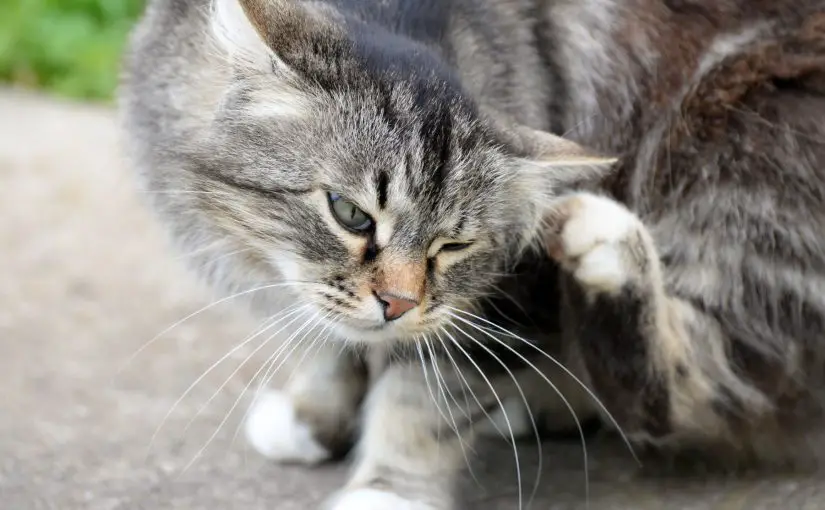Table of Contents
Does Vinegar Kill Fleas?
The short answer is yes, vinegar can kill fleas. This is because vinegar contains acetic acid, which disrupts the flea’s exoskeleton through its acidic properties, leading to dehydration and death in fleas. However, vinegar should not be relied on as the sole treatment option for flea control and prevention.
Introduction
 Fleas are one of the most irritating and problematic pests that I can think of that any pet owner has to do with from time to time.
Fleas are one of the most irritating and problematic pests that I can think of that any pet owner has to do with from time to time.
More than just an annoyance, fleas can also pose health risks to both animals and humans. For example, my teenage daughter recently rescued a kitten and brought it home as a new pet.
Unbeknownst to us, the kitten was severely infested with fleas. Our sweet new furry friend soon introduced fleas into my daughter’s bedroom. She began waking up with dozens of small, itchy bites all over her body. At first we thought she had chickenpox or something,
But after some detective work, we realized the culprit behind the mysterious bites was in fact fleas from the infested kitten!
This unsettling experience demonstrated just how rapidly fleas can spread through a home. Within days, they had already jumped from our new pet onto my daughter, causing an outbreak of itchy and painful bites.
It quickly became evident that we needed to do something fast to get rid of them. And all out laundry fest ensued as well as spraying every item in her room down with flea killer.
So let’s get into a little more about how vinegar can possibly be a solution for fleas.
How Vinegar Kills Fleas
Vinegar is able to kill fleas through its acidic nature. The acetic acid found in vinegar interferes with the flea’s exoskeleton, causing the cuticle layer to breakdown. This leads to severe dehydration and eventual death of the flea.
Additionally, the acetic acid can also kill flea eggs and larvae it comes into direct contact with. However, vinegar does not provide any residual control. It only kills the fleas and eggs it touches during application.
Vinegar’s Effectiveness on Fleas
While vinegar can kill adult fleas, eggs, and larvae, it has some significant limitations:
- Short-term effects – Vinegar dries quickly and does not keep killing fleas after the initial application
- Frequent reapplication needed – To keep killing newly emerged fleas, vinegar must be applied every few days
- Does not kill all life stages – Vinegar cannot penetrate deeply into carpets or bedding to kill eggs and larvae
- Does not prevent future infestations – Vinegar does not have any residual effects to keep killing fleas long-term
Using Vinegar on Pets for Fleas
Many pet owners use diluted vinegar solutions to treat flea infestations on dogs and cats. You can make a simple 50/50 mixture of vinegar and water and apply it as a spray or shampoo.
When using vinegar on pets:
- Avoid getting in eyes and ears
- Always test first on a small area of skin
- Rinse thoroughly after a 5-10 minute contact time
- Do not use long-term, as the acidity can dry out skin
- Monitor for skin irritation or allergic reactions
- Consult your veterinarian before using on cats
Vinegar can offer immediate relief by killing the fleas on your pet’s coat. But it does not provide lasting protection, as it is quickly metabolized and rinsed off.
Using Vinegar Around Your Home
You can also use diluted vinegar to kill fleas in infested areas around your home. Some ways to use vinegar include:
- Spray carpets, upholstery, and pet bedding
- Add to laundry when washing pet bedding and blankets
- Mop hard floors
- Wipe down floors and surfaces
Focus on areas where your pets spend the most time. The vinegar solution will kill adult fleas and eggs through direct contact. However, vinegar does not penetrate deeply into carpets, furniture, and bedding to kill all life stages.
Other Homemade Flea Sprays
There are also some other homemade flea sprays you can make using common household ingredients:
| Spray | Method |
|---|---|
| Soap and water | Dissolve 2% soap in water and spray on carpets. Can help kill fleas through suffocation and dessication. |
| Lemon juice | Contains citric acid that can kill and repel fleas. Mix equal parts lemon juice and water. |
| Saltwater | Dissolve 1/2 cup salt in 1 gallon water. Can dessicate and dehydrate fleas. |
However, as with vinegar, these homemade options will also only provide short-term flea control and need very frequent reapplication.
 Is Vinegar Enough for Flea Treatment?
Is Vinegar Enough for Flea Treatment?
While vinegar and other homemade sprays can help supplement your flea control efforts and provide immediate relief, they should not be your only line of defense. For severe flea infestations, you will likely need additional treatment methods for more thorough and long-lasting control.
Some additional flea treatment options include:
-
-
- Veterinarian-prescribed flea prevention – Products like Nexgard, Bravecto, Frontline, and Advantage II kill fleas and prevent future infestations for 1-3 months.
- Insect growth regulators (IGRs) – Apply these to carpets and furniture to kill eggs and prevent larvae from developing into adults.
- Flea powder – Desiccating dusts like diatomaceous earth can be worked deep into carpets to kill fleas.
- Flea traps – Light and vibration traps attract and catch adult fleas.
- Flea combs – Useful for removing fleas from your pet’s coat.
- Flea shampoos and dips – Kill fleas on contact and provide very short-term protection.
- Professional exterminator – For severe infestations, hire a pest control company to perform whole-home deep cleaning, steam sanitation, and chemical treatment.
-
Integrated Flea Management Plan
The most effective approach combines several flea killing and prevention methods together into an integrated pest management plan. This attacks all flea life stages and provides both immediate relief and lasting protection.
An example plan could include:
-
-
- Treating all pets in the household with an effective flea prevention like Frontline, Advantage II, or Seresto collars.
- Vacuuming all floors, furniture, and pet areas at least 2-3 times per week to remove eggs and larvae.
- Washing all pet bedding weekly in hot soapy water to kill all stages.
- Applying an IGR like methoprene or pyriproxyfen in pet areas and vacuuming after 2-3 weeks.
- Using vinegar, lemon juice, or soap sprays for immediate kill of adult fleas on surfaces.
- Bathing pets with a flea shampoo or short-term prevention dip.
- Using flea combs to monitor and remove fleas from your pet.
- Setting flea traps around the home to catch adults.
-
This comprehensive approach helps ensure no life stage is missed. The long-acting medications prevent re-infestations for months at a time, while the pesticides and frequent cleaning kill off any remaining fleas in the environment.
Tips for Effective Vinegar Use
Here are some tips to keep in mind when using vinegar strategically as part of your flea killing arsenal:
-
-
- Use white distilled vinegar with 5-6% acidity for maximum effectiveness.
- Dilute with an equal amount of water so the spray is not too strong.
- Spray surfaces until damp but not dripping. Pay special attention to cracks and dark areas.
- Allow vinegar to sit for 5-10 minutes before wiping or rinsing.
- Reapply every 3-4 days to kill newly emerged adult fleas.
- Combine with essential oils like peppermint, citrus, or eucalyptus to repel fleas.
- Spot test on furniture to check for discoloration or damage before spraying.
- Open windows and use fans while spraying to ventilate.
- Wear gloves and avoid getting vinegar on bare skin.
- Keep pets and children away during application and until surfaces are dry.
-
Risks and Precautions with Vinegar
Vinegar is generally safe when used properly on pets and around the home. However, there are some risks and precautions to be aware of:
-
-
- Vinegar can irritate eyes, nose, and throat – avoid breathing in spray mist
- Can damage or discolor some floors, fabrics, and finishes
- Cats are especially sensitive – consult your vet before using vinegar on cats
- Can dry out pet’s skin if used frequently or left to soak in
- Never spray vinegar directly in pet’s face or ears
- Rinse outdoor surfaces before allowing pets to enter, as they may ingest residue
- Wear gloves when spraying larger areas and wash hands after
- Keep treats and food bowls covered when spraying around your home
-
Diluting vinegar with water and rinsing surfaces thoroughly helps reduce the risks. Monitor your pet after use to ensure no negative reaction. Discontinue use if any skin irritation or respiratory distress occurs.
When to Call an Exterminator
In severe flea infestations, it may be necessary to call in professional pest control. Signs that expert assistance is needed include:
-
-
- Fleas found on every pet in the household
- Bites and skin irritation observed on pets and humans
- Fleas visible on flooring, furniture, and bedding
- Black specks of dried blood (flea dirt) seen where pets sleep or frequent
- Eggs and larvae in carpets, cracks, and pet areas
- Fleas returning within days of at-home treatment
-
Professional exterminators have access to powerful insecticides and growth regulators that homeowners do not. They can perform deep cleaning, steam sanitation, fumigation, and spray treatments that penetrate everywhere fleas hide.
While not cheap, calling in the experts can more effectively eliminate severe flea problems. They also know how best to integrate various control methods for long-term prevention.
The Bottom Line
Vinegar can certainly help kill fleas through its acetic acid content. However, it should only play a supporting role in a comprehensive flea control plan. Relying solely on vinegar and homemade sprays will not be enough to tackle severe, entrenched infestations. You need veterinarian-recommended medications, thorough cleaning, and professional pest control when needed.
Use vinegar strategically to provide supplemental flea killing power. But also take steps to prevent future infestations and completely break the flea life cycle within your home for good.


 Is Vinegar Enough for Flea Treatment?
Is Vinegar Enough for Flea Treatment?